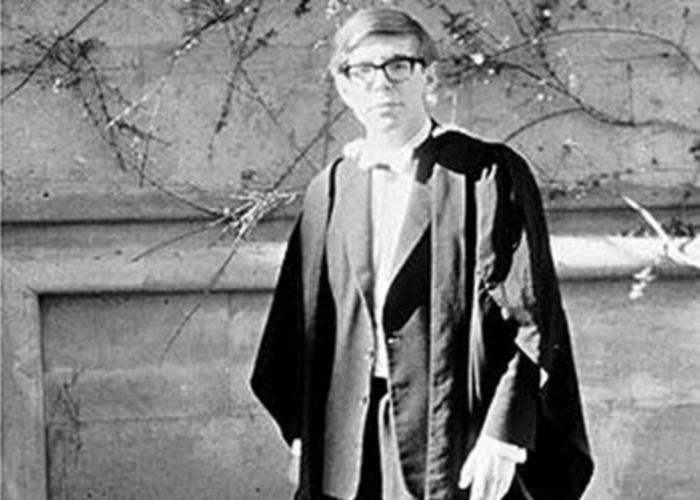Stephen Hawking was a renowned British theoretical physicist, cosmologist, and author who made significant contributions to the field of science. His groundbreaking research on black holes, the origin of the universe, and the nature of time has profoundly impacted our understanding of the cosmos.
Despite facing immense physical challenges due to a progressive motor neuron disease, Hawking’s brilliance and determination propelled him to become one of the most influential scientists of our time.

First, know a little life of Stephen Hawking and we will review over its complex work, and then choose some of his best quotes. We are facing a bright, ahead of its time and very skeptical mind so that their statements can teach valuable lessons for the day.
Stephen Hawking’s life:
Stephen Hawking was born in Oxford in 1942, the son of a specialized researcher in biology. His full name is Stephen William Hawking. During his childhood, he was a good student, although nothing outstanding.
Although he wanted to study mathematics, he decided to enroll in the University of Oxford’s natural sciences program because thermodynamics, relativity, and quantum mechanics piqued his interest. Students were surprised by his intelligence in college, but their academic habits were sloppy (they practiced long or boredom caused their classes), and notes were taken discretely.
He received his PhD in Physics from Cambridge in 1966, but he has received twelve doctorates honoris causa over the years. During his graduation, he began to experience the first symptoms of ALS and had to leave for a short time.
According to those who warned doctors, they mysteriously outlived two or three years. He began a career during which he deepened the theory of black holes (in collaboration with Roger Penrose) and singularities in relativity and also developed models for the spatial-temporal limits of the universe.

His illness has gone down, but he has not departed from the public scene. He still speaks with a voice synthesizer from his wheelchair. He was the Lucasian Chair of the University of Cambridge (which once belonged to Isaac Newton) for 30 years and received the Prince of Asturias Award in 1989.
He has published scientific works, including the successful “Brief History of Weather.” Stephen Hawking, approaching his 73rd birthday and suffering from a serious illness, can only communicate but remains an example of scientific genius and willpower.
Scientific Contributions
Hawking’s contributions to the scientific community are numerous and groundbreaking. His research on black holes revolutionized our understanding of these mysterious celestial objects.
He proposed that black holes emit radiation, now known as “Hawking radiation,” which challenges the traditional notion that nothing can escape the gravitational pull of a black hole.
Theories and Discoveries
In addition to his work on black holes, Hawking made significant contributions to cosmology and quantum mechanics. He formulated the theory of the “Big Bang,” which suggests that the universe originated from a singularity and has been expanding ever since.
Hawking’s discoveries shed light on the fundamental nature of space, time, and the universe’s origins.
Popularization of Science
Beyond his scientific achievements, Hawking played a crucial role in popularizing science and making complex concepts accessible to the general public. His best-selling book, “A Brief History of Time,” became an international phenomenon and introduced millions of people to the universe’s wonders.
Hawking’s charismatic personality and ability to explain complex theories in simple terms made him a beloved figure worldwide.
What Happened to Stephen Hawking?
The truth is that Stephen Hawking’s life has been hard. Although he exceeded the 50 years that doctors gave him when they discovered his illness, the famous physicist has not had it easy.
Others had surrendered, but the British have always stood out for their unwavering spirit and have never shied away from its activity. This quote explains it perfectly:
You cannot afford to be disabled in spirit as well as physically.
Stephen Hawking is an atheist, but he does not hesitate to use the word “God” when he wants to lead, sometimes as a metaphor for the laws that govern the universe and sometimes as an imaginary being. It is one of his typical daring phrases that says God must be boring. Of course, with their intellectual curiosity, it is a very coherent statement:
The human race needs an intellectual challenge.It must be boring to be God, and have nothing to discover.
Stephen Hawking Although not religious, there is no doubt that humans have something special that has never been seen before on Earth. And this quotation makes it very clear that the origins of humanity could not be more humble. Still, we should aspire to everything, especially knowledge, which is what will make us accomplish things that seem impossible:
We are just an advanced breed of monkeys on a minor planet of a very average star. However, we can understand the universe. That makes us something very special.
We have already seen that Stephen Hawking takes everything good that can come out of his serious illness, but he is an intelligent person. It is not just your attitude. Know that staying positive is the best thing for him and those around him. This interesting phrase gives us an idea of how such a sensitive issue arises:
It is a waste of time to be angry about my disability. One has to go on, and I have not done wrong. People do not pay attention if you’re always angry or complaining.

Personal Life
Despite his physical limitations, Hawking maintained an active personal life. He married Jane Wilde in 1965, and the couple had three children together. However, the strains of his illness and his demanding scientific career eventually led to their separation. Hawking later married his nurse, Elaine Mason, in 1995, but the marriage ended in divorce in 2006.
Awards and Recognitions
Hawking’s remarkable scientific contributions have been recognized with numerous prestigious awards and honours. He was elected a Fellow of the Royal Society, one of the highest honours for a scientist in the United Kingdom. He was also awarded the Albert Einstein Medal, the Copley Medal, and the Presidential Medal of Freedom, among many others.
Legacy and Impact
Stephen Hawking’s legacy extends far beyond the scientific community. His determination in the face of adversity serves as an inspiration to millions around the world. Hawking’s work continues to shape the field of theoretical physics, and his popularization of science has ignited a passion for discovery in countless individuals. His intellectual prowess, resilience, and groundbreaking research will be remembered for generations.
The future:
Stephen Hawking likes to speculate on issues that seem to be taken from science fiction. I do not see it as likely that we will soon contact aliens, but the English physicist does not think that is good for us. If you came to Earth, the result could be similar to films like Independence Day, but with a very different ending. This is his statement:
If aliens visit us, the outcome would be no different from the arrival of Columbus to America. And we know that was not very good for Native Americans.
The debate about whether science is dangerous is very old, but Hawking is clear that it is. Humans are capable of the worst, and science and technology merely allow us to further exercise our destructive power. This phrase represents a clear example of a man of clear pacifist ideals, who is conscious of the responsibilities of science:
The danger lies in our power to harm or destroy the environment or neighbour increases much faster than our wisdom in using that power.
Another example shows that Hawking does not harbour much faith in humanity. Though we saw that human intelligence makes it a unique creature, that does not mean there is a real utility for the species to survive. It is what he said on this issue, a phrase that can give us food for thought:
It is not clear that intelligence has any survival value long term.
Finally, a very interesting quote from the year a human probe landed on a comet. Hawking reflects on the future of humanity in the coming centuries, and it is clear that we have to leave the planet where we were born. The famous scientist may not believe in humanity, but he believes in technological progress:
The human race will not survive the next thousand years unless we disseminate through space. Many accidents can end the life of a single planet. But I am optimistic. Reach for the stars.
Stephen Hawking – An exceptional man

Since then, Stephen Hawking has been a special man, both physically and as a person. However, his work has not been deserving of a Nobel Prize. His life, full of adversity, has caused him to be one of the most renowned scientists today. Today his academic work can be terminated, but the figure is still very important.
Of course, these quotes have taught us much about a single human who has never given up. It is a pity that Stephen Hawking’s health deteriorated so quickly because he could have done much for the popularization of science. Thanks to books and A Brief History of Time, we will remember this man forever.
Frequently Asked Questions (FAQs)
Did Stephen Hawking discover black holes?
No, Stephen Hawking did not discover black holes, but his research significantly contributed to our understanding of them. He proposed the idea of black holes emitting Hawking radiation.
What is Hawking radiation?
The radiation that black holes are believed to emit is known as hawking radiation. According to Stephen Hawking’s calculations, black holes are not completely black but emit particles over time due to quantum effects.
How long did Stephen Hawking live with ALS?
Stephen Hawking was diagnosed with ALS at 21 and defied medical expectations by living with the disease for over five decades. He passed away on March 14, 2018, at 76.
What is Stephen Hawking’s most famous book?
Stephen Hawking’s most famous book, “A Brief History of Time,” provides an overview of cosmology, the universe’s origins, and the nature of time. It became a worldwide bestseller and remains a popular science book.
What is Stephen Hawking’s lasting legacy?
Stephen Hawking’s lasting legacy is his significant contributions to theoretical physics, especially in black holes, cosmology, and the origins of the universe. He popularized science and inspired millions to engage with the wonders of the cosmos.
Conclusion
Stephen Hawking’s life and work exemplify the power of the human mind to overcome physical limitations and make profound contributions to the world of science.
His groundbreaking theories and discoveries have reshaped our understanding of the universe, while his ability to communicate complex ideas to a broad audience has sparked curiosity and interest in science. Stephen Hawking will forever be remembered as one of the greatest scientific minds in history.






